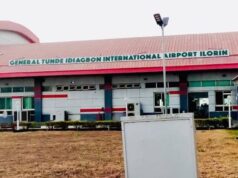 A feeling of de javu in the Nigerian political milieu seems to flow from the Marxian anecdote that “History repeats itself, the first as tragedy and then as farce.” Ahead of constitution of the leadership of the 9th National Assembly in June, this year, this presents a real bugaboo, particularly, to the All Progressives Congress (APC).
A feeling of de javu in the Nigerian political milieu seems to flow from the Marxian anecdote that “History repeats itself, the first as tragedy and then as farce.” Ahead of constitution of the leadership of the 9th National Assembly in June, this year, this presents a real bugaboo, particularly, to the All Progressives Congress (APC).
There is a historical context to the current anxiety within and outside the party. The constitution of the 8th National Assembly leadership in 2015 was a critical point of departure from the culture of suzerainty in which the governing party, with the majority seats in both Chambers, reins in the conflicting aspirations of its members in compliance with its zoning arrangements.
But, unable to contain internal dissonance, the leadership of the APC, in 2015, lost its core role in guiding members who were interested in the positions of presiding officers to exercise their rights within the ambit of party’s decisions. The ramification of that loss of control was the emergence of Bukola Saraki as senate president, contrary to the party’s choice.
The APC caucus in the Senate was irredeemably fractured and effort was dissipated along different directions as a plethora of aspirants pushed for the Senate Presidency. Saraki from the North Central zone was one of them. He was sufficiently prepared to step in the saddle, but lacked APC leadership’s endorsement.
Conversely, Ahmed Lawan from the North East zone, with the support of the leadership, looked good to clinch the position. George Akume from North Central dropped his aspiration to queue behind Lawan for the position of Deputy Senate President (DSP).
But Saraki had quickly deployed his political legerdemain in the circumstance to undercut, circumvent and upstage the applecart of the APC high-command to become Senate President.
Clearly piqued that Saraki was victorious against its internal arrangements, the APC took his victory as far less painful than the stratagem he deployed. The astute Saraki worked in cahoots with the PDP caucus to secure the critical simple majority votes – and in the spirit of the deal – trading away the position of DSP to the opposition party. Ike Ekweremadu emerged to retain the position that he had held for eight years in a PDP-controlled Senate.
The emergence of the Saraki-Ekweremadu leadership by subterfuge and sheer conspiratorial alliance has become history. It is a painful history that continues to remind the APC of how it historically mismanaged its majority position in the 8th National Assembly. Even in the House of Representatives, the APC was unable to enforce its choice of Femi Gbajabiamila from the South West zone as Speaker. The forces that upended APC’s arrangements in the Senate reportedly supported Hon. Yakubu Dogara from the North East zone to emerge as Speaker.
The convoluted trajectory by the APC in 2015, which produced a National Assembly leadership perpetually feuding with the Buhari Presidency, presents in much bolder relief the tragic nature and dimensions of the party’s recent inexplicable history of allowing an otherwise simple matter of selection of National Assembly leadership to go awry.
To be sure, the APC leadership, under the national chairmanship of Chief John Odigie-Oyegun, proved unimaginably inept in managing the process in a very utilitarian fashion. Through laissez-faire footing and perverse compromise, the party leadership failed to rein in its members in the National Assembly.
Reflectively, Buhari was complicit in the hypocrisy that damaged the APC. Whereas, Buhari was purported to have preferred the North East zone to produce the Senate President and, specifically, Senator Ahmed Lawan, he did not push the agenda through as an imperative presidential action. He was even reported to have scheduled a meeting with the APC senate caucus on the morning of the inauguration of the 8thNational Assembly to issue the final directive.
The President did not show up for the meeting, which was fixed for the same time the Senate was being inaugurated. Saraki had already been elected unopposed as Senate President before the majority members of the APC caucus got to the chamber. For not effectively pulling whatever strings behind the scene, perhaps, as not to be seen to be teleguiding the constitution of the National Assembly leadership, Buhari and his party paid the price for their imprudence for all of four years under the Saraki/Dogara leadership.
Currently, the 2015 scenario is building up ahead of the inauguration of the 9th National Assembly. Will the APC and President Buhari allow a repeat of history? It will be farcical if, under his nose and in a back-to-back manner, the President allows the 2015 ‘tragedy’ to be re-enacted. Desperation, muted APC leadership and cloaked presidential interest in the leadership of the federal legislature, which are some of the conditions precedent for the repeat of that tragic history, exist in the APC.
Why is there apparent desperation for the position of the Senate President and Speaker? In the North East, three ranking senators -Lawan, Ali Ndume and Danjuma Goje are jostling for the position. Lawan has already elevated his campaign some notches by announcing his interest during a crowded media interactive session in Abuja last weekend.
There are fears that Ndume, who was supplanted by Lawan as Senate Leader in the 8th Senate, sees this as an opportunity to take his pound of flesh. Ndume believes that Lawan colluded with Saraki to effect his removal as Senate Leader without prior notice or complaints. Ndume had stepped out to pray only for him to return to the Chamber to discover that he had been removed and replaced with Lawan. Saraki and his loyalists, according to feelers, are comfortable with Lawan; certainly not with Ndume.
Goje provides the third leg of the North East APC tripod targeting the senate presidency. There are reports that Goje enjoys the support of the Saraki group because he appears more acquiescent to the group in its bid to secure the position of Deputy Senate President, acting in concert with the PDP caucus.
Some APC quarters are leery of the party leadership zoning the senate presidency to the North East, which is capable of spawning crisis. The argument in some quarters is that APC should be politically sagacious to turn away from the North East and guide the senate presidency to the North Central zone. The zone has yet to throw up overtly desperate ranking senators. Ranking senators have not unsettled the zone on the altar of vaulting aspirations.
The consensus is that the APC should tread the path of least resistance and acrimony. The North West zone and the South West zone are not the path to tread, having produced the president and vice president respectively. The South-south zone has produced the position of national chairman of the APC. Whereas, the South East zone has two ranking members of the National Assembly, do the APC apparatchiks consider the zone qualified in terms of performance in the 2019 general election and commitment to the party platform to produce the Senate President?
In the House of Representatives, no fewer than 13 members-elect are jostling for the position of Speaker. This is the reason the APC leadership, acting in concert with Buhari, must act proactively to avert the Sword of Damocles that the National Assembly leadership contests typify. Comrade Adams Oshiomhole and Buhari must be on top of the process this time round.
Hear Marx again: “Men make their own history, but they do not make it as they please; they do not make it under self-selected circumstances, but under circumstances existing already, given and transmitted from the past.” Oshiomhole and Buhari must be appropriately instructed.
· Ojeifo, journalist and public affairs analyst, contributed this piece via ojwonderngr@yahoo.com






